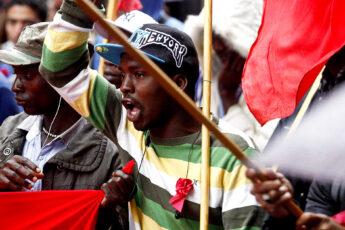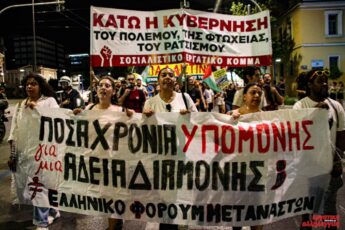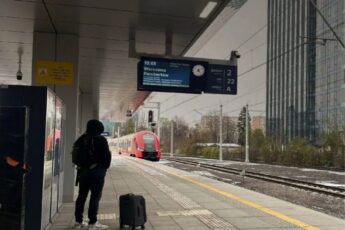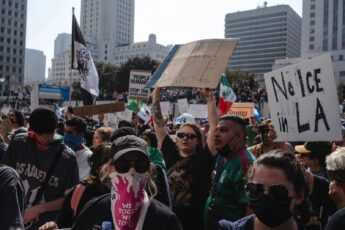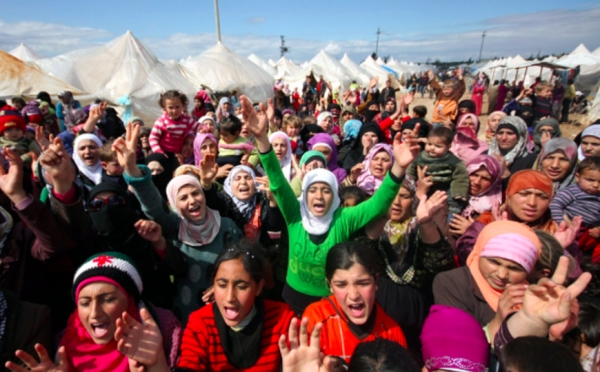
Call for an online public assembly on March 1, 2025, at 5:00 pm (CET)
by Transnational Migrant Coordination
In recent months, the political shift to the right has moved from being just a global trend to becoming the new reality. In the chaotic new political scenario we live in, two things still happen to be quite sure: the increase of racist violence and exploitation and the unstoppable migrants’ struggle for freedom and better lives that keep on shaking the transnational border regime.
We are facing a new political scenario dominated by far-right governments, increasing racist and patriarchal violence, an unbridled capitalist offensive, and a world war that has drastically reshaped our living conditions and fields of struggle. Everywhere, the final imposition of far-right politics and ideology has become the new “normality”. It has brought a relentless and ferocious attack on migrants’ freedom of movement, their use of asylum laws as a way to stay in Europe, and their living and working conditions. The war in Ukraine, the genocide in Gaza, and the spread of the logic of the war have all contributed to the rise of the militaristic and nationalist policies and discourses that are now flaming up racist hatred and closing oppositional spaces of migrant and anti-racist struggles in Germany, Italy, Israel, and Turkey.
The first weeks of Trump’s administration have been marked by the legitimization of mass deportations as a tool to control and threaten migrants. In Germany, the electoral campaign has revolved around the issue of migration, where the political agenda on migrations of the neo-Nazi AfD party has finally now gained the support of the traditional so-called “liberal” parties. In Italy, Meloni’s plan to deport migrants to the reception center in Albania has failed so far on legal grounds. Still, it has also gained the political support of European governments as a “model” for migration management. The European Pact on Migration and Asylum that was approved last April, despite not yet being in force, has already produced its effects within and along the European borders: stricter criteria for asylum seekers, more controls and violence at the border, more pushback, and the threat of deportations as a politics of fear.
These are just a few telling examples of how the attack on migrants is developing on a transnational scale. Every government in Europe, regardless of its political color, has to recognize that migrants’ labor is essential to national economies. But at the same time, migrants’ freedom and the very possibility of a better life are being eroded every day by these same governments. In fact, right after the fall of the Assad’s regime, politicians everywhere in Europe rushed to demand the end of the protection guaranteed thus far to Syrian refugees, whose right to stay must now be linked to the skills they can provide to the labor market.
Although this has been so far just a threat, we can see that the shrinking of asylum rights is just the last chapter of a transnational war waged against migrants, whose political meaning cannot be reduced to a specific national context or a specific legal status. The blackmail of the residence permit, which has so far linked the possibility to stay with the whims of the bosses or to the marital status, therefore imposing double oppression on migrant women, has therefore to be extended now as the only possibility to stay legally.
Let’s be clear, the power of migrant movements won’t be stopped by any plan of far-right governments: despite the attempts to regulate migrant flows according to the need of capital, migrants will keep crossing the borders in search of a better life. Demonstrations and social unrest are taking place against these deadly politics, as migrants, workers, women, and LGBTQI people do not want to surrender to the new political scenario. But these struggles risk remaining fragmented and losing their political power if they are not organized under a common struggle frame.
Therefore, our questions are: What are the common challenges against which we should organize in the first place? How to organize and collectively respond to this scenario, considering today’s global fragmentation and difficulties? Which political claims can help us to connect and empower our local struggles?
We believe that this attack on asylum seekers calls into question our migrant and anti-racist fights, as it requires new strategies and a new political discourse in order to give more power to migrant movements and to the transnational struggle against institutional racism, capitalist exploitation, and patriarchal violence. This is the moment to connect all our efforts and forms of organization.
As Transnational Migrant Coordination, we invite migrants, anti-racist, and feminist activists to join our next public online assembly to discuss the ongoing political transformations and to find common words and common discourses that can help us to organise and challenge this attack.
See you Saturday 1st of March 2025 at 5:00 pm (CET)
Link to the Zoom meeting
https://us02web.zoom.us/j/86858022866?pwd=M9zmh66lN3ykV2CBKmfYNb3oHMsxeJ.1


